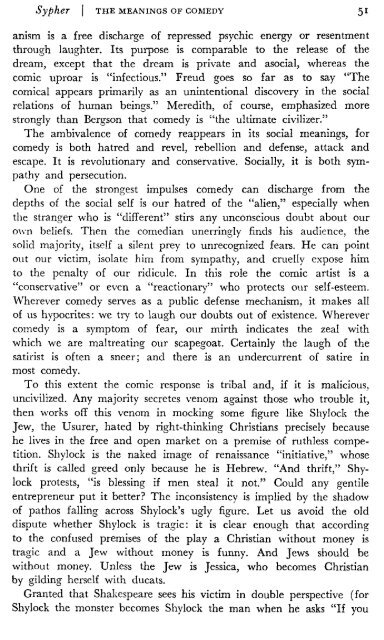The Meanings of Comedy* - Shakespeare Navigators
The Meanings of Comedy* - Shakespeare Navigators
The Meanings of Comedy* - Shakespeare Navigators
You also want an ePaper? Increase the reach of your titles
YUMPU automatically turns print PDFs into web optimized ePapers that Google loves.
Sypher I rrrr MEANTNGs oF corlrEDy<br />
5I<br />
anism is a free discharge <strong>of</strong> repressed psychic energy or resentment<br />
through laughter. Its purpose is comparable to the release <strong>of</strong> the<br />
dream, except that the dream is private and asocial, whereas the<br />
comic uproar is "infectious." Freud goes so far as to say "<strong>The</strong><br />
comical appears primarily as an unintentional discovery in the social<br />
relations <strong>of</strong> human beings." Meredith, <strong>of</strong> course, emphasized more<br />
strongly than Bergson that comedy is "the ultimate civilizer."<br />
<strong>The</strong> ambivalence <strong>of</strong> comedy reappears in its social meanings, for<br />
comedy is both hatred and revel, rebellion and defense, attack and<br />
escape. ft is revolutionary and conservative. Socially, it is both sympathy<br />
and persecution.<br />
One <strong>of</strong> the strongest impulses comedy can discharge from the<br />
depths <strong>of</strong> the social self is our hatred <strong>of</strong> the "alien," especially when<br />
tlie stranger who is "different" stirs any unconscious doubt about our<br />
orvn beliefs. <strong>The</strong>n the comedian unerringly finds his audience, the<br />
solid majority, itself a silent prey to unrecognized fears. He can point<br />
out our victim, isolate him from syrnpathy, and cruelly expose him<br />
to the penalty <strong>of</strong> our ridicule. In this role the comic artist is a<br />
"conservative" or e!'en a "reactionary" who protects our self-esteem.<br />
Wherever comedy serves as a public defense mechanism, it makes ail<br />
<strong>of</strong> us hvpocrites: we try to laugh our doubts out <strong>of</strong> existence, Wherever<br />
comedy is a symptom <strong>of</strong> fear, our mirth indicates the zeal with<br />
which we are maltreating our scapegoat. Certainly the laugh <strong>of</strong> the<br />
satirist is <strong>of</strong>ten a sneert and there is an undercurrent <strong>of</strong> satire in<br />
most comedy.<br />
To this extent the comic response is tribal and, if it is malicious,<br />
uncivilized. Any majority secretes venom aga"inst those who trouble it,<br />
then works <strong>of</strong>f this venom in mocking some figure like Shylock the<br />
Jew, the lJsurer, hated by right-thinking Christians precisely because<br />
he Jives in the free and open market on a premise <strong>of</strong> ruthless competition.<br />
Shylock is the naked image <strong>of</strong> renaissance "initiative," whose<br />
thrift is called greed only because he is Hebrew. "And thrift," Shylock<br />
protests, "is blessing if men steal it not." Could any gentile<br />
entrepreneur put it better <strong>The</strong> inconsistency is implied by the shadow<br />
<strong>of</strong> pathos falling across Shylock's ugly figure. Let us avoid the old<br />
dispute whether Shylock is tragic: it is clear enough that according<br />
to the confused premises <strong>of</strong> the play a Christian without money is<br />
tragic and a Jew without money is funny. And Jews should be<br />
without money. Unless the Jew is Jessica, who becomes Christian<br />
by gilding herself with ducats.<br />
Granted that Shaliespeare sees his victim in double perspective (for<br />
Shylock the monster becomes Shylock the man when he asks "If you


